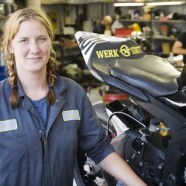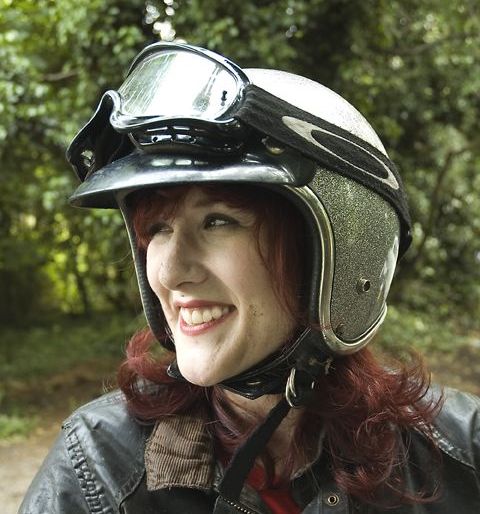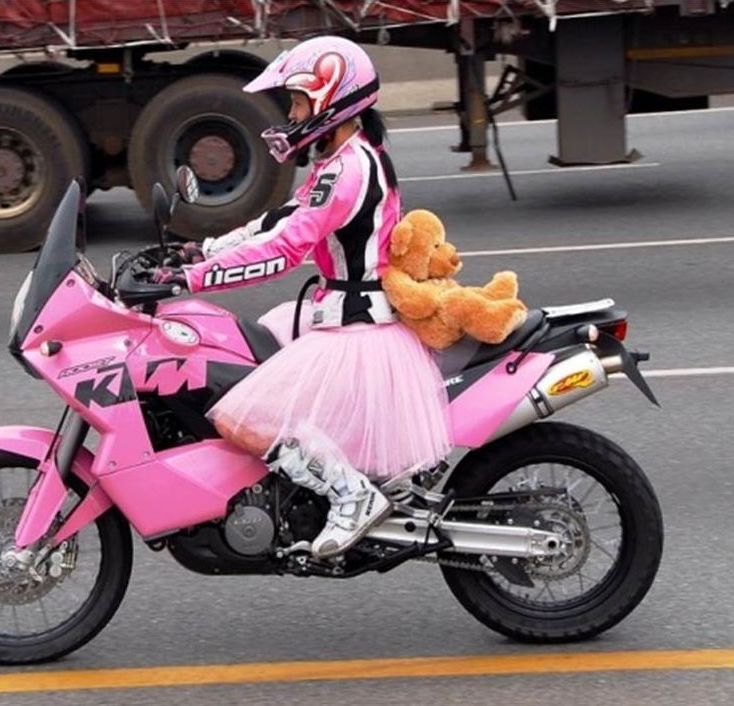Jennifer Bromme
Jennifer Bromme from San Francisco, California, runs her own motorcycle repair shop. Her path into motorcycling and her stories about wrenching make for a really fun read. Perhaps they will also inspire you to go break out that manual and start wrenching on your own bike! [Rashmi Tambe, Editor]
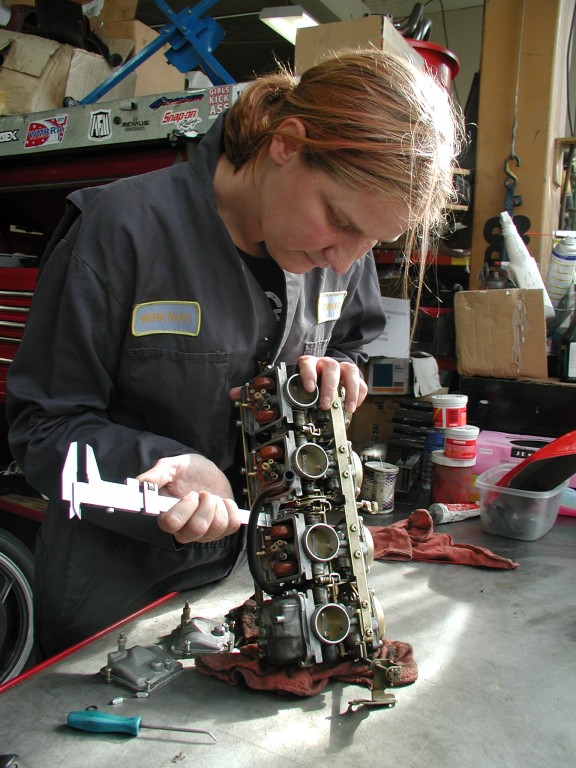
Hello Jennifer, can you introduce yourself?
Hi, my name is Jennifer Bromme, I was born in the US but I grew up in Germany. I started riding a Yamaha XT500 in Germany at age 18, and took it all over Italy and Greece. I did a 3 year apprenticeship in Germany in a Yamaha-Honda dealership in Munich.
My first project bike was a Nuovo Falcone Moto Guzzi that was literally a basket case, as I bought it disassembled and delivered in baskets. Putting that together from a poor copy of an Italian parts diagram made me learn a lot about engines and mechanics! It took me 2 years and a lot of trial and error, but it ran eventually and I took it from Germany over the Alps to Italy a few times.
I then moved to the US and got a job as a mechanic, and after 8 months decided that I could open my own shop. Sadly, my big plans on riding from San Francisco to the southernmost tip of Argentina haven’t manifested yet since I have been running the shop ever since. Now I have two little children, but they’ll be dirt biking soon enough, and maybe they’ll join me on that trip when they get older!
I raced motorcycles and sidecars for more than ten years and am still involved in racing by sponsoring other racers. I don’t ride as frequently as I used to, but I still do a few bigger rides a year, and I commute to work on a motorcycle whenever I can.

Jennifer Bromme on the shop floor. (Photo Credit: Sara Lyon)
Can you describe your path from motorcyclist to motorcycle mechanic to independent motorcycle mechanic shop owner?
Sure! When I was riding my first bike – an XT500 – the front sprocket nut fell off and with it the front sprocket. I was still in school and living at home, so I called my dad and he towed me to the nearest shop with a tow rope on his car. They didn’t have the right nut to tighten the front sprocket back on and decided to weld it on instead. I was 18 and didn’t know any better, so I agreed on that repair.
They probably figured I’d never ride the bike long enough to wear it out and need a new sprocket . But I rode that bike all over Europe and wore the sprocket out, so eventually it had to be replaced. The only way to do that was to replace the transmission output shaft that the sprocket was welded to which involved splitting the crankcase. This meant that the engine had to come out and be taken apart to the last bolt to get to it. Argghh! My dad was an electrical engineer with ten thumbs, so I bought a manual and set out to do it myself.
I did have some mechanical experience by that time since the bike kept breaking down for a multitude of other reasons. :) I bought a torque wrench and some tools, which my dad helped me pay for. We didn’t have a garage, so I took the bike apart in my room. It was located on the second floor of the house, so I dragged it up there, laid out a bunch of newspaper and proceeded.
When it came time to split the cases, I didn’t have the money to buy the right puller tools. Somebody said to stick it into an oven, so the heat could expand everything and it would be easy to pull apart without tools. It worked like a charm! The downside was that in the process a bunch of oil spilled in the oven and made subsequent bakings smell interesting. :) My dad wasn’t too happy! I got it done, put the engine back together, and it ran until I sold it. While I had the bike taken apart, I also put a high compression piston in it and raised the displacement to 535 cc, so the bike pulled wheelies in 3rd gear afterwards, much to the entertainment of my schoolmates.
My motorcycle friends didn’t think I could rebuild my own engine, but they did give me advice when I asked. I was mighty proud when I got it done. It made me realize that with tenacity and not getting deterred by what other people thought you could and couldn’t do you could get anything done that you set your mind to.
A little while later I decided to do a mechanic apprenticeship to learn more, so that I didn’t have to rely on bad advice like welding that sprocket back on instead of ordering the right part. When I came to the US, that is what I knew, and I ended up opening a shop with the intention to treat women with more respect than I had been treated with (and the guys as well, of course). I’m still running that shop 20 years later!
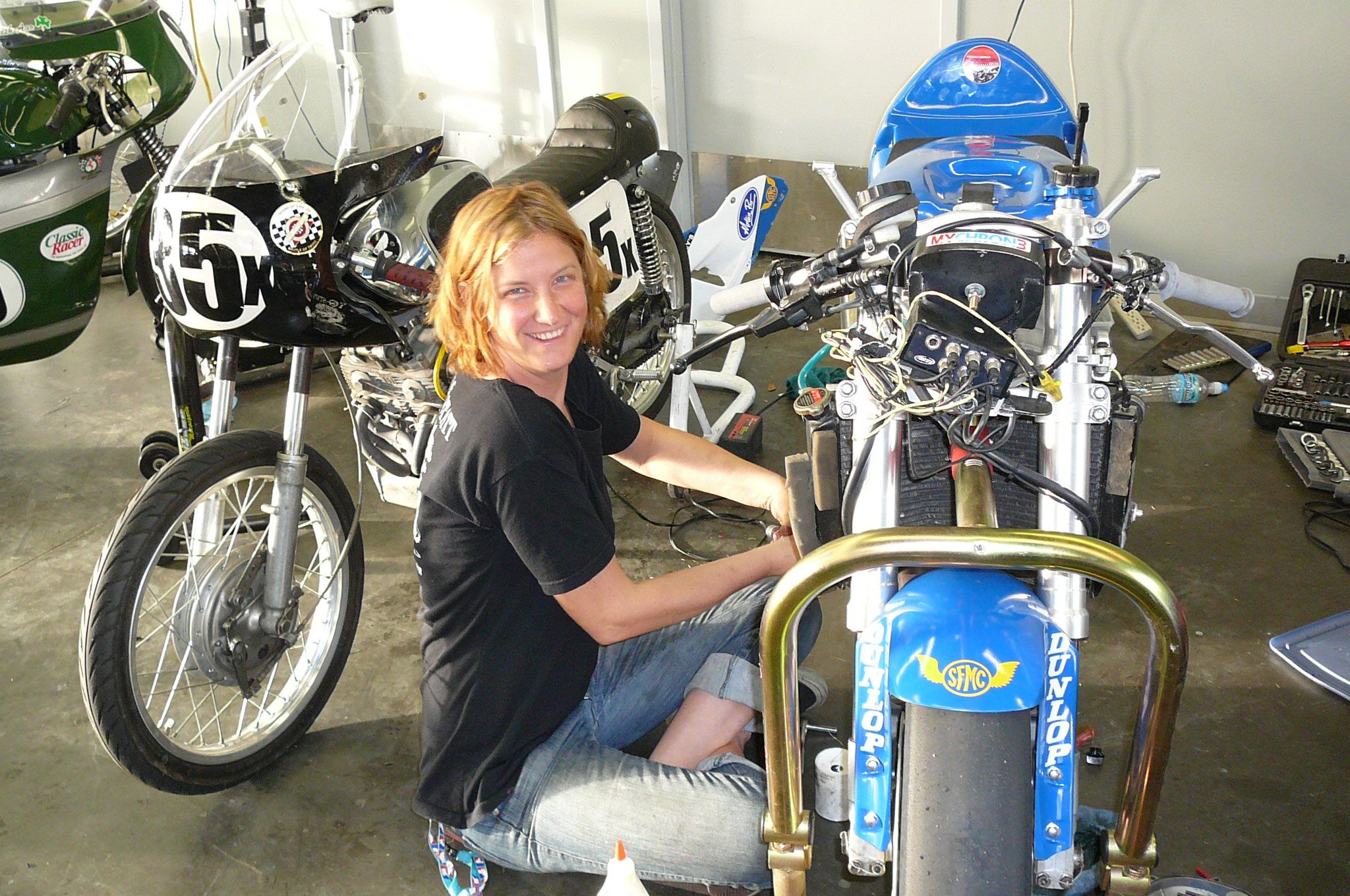
Jennifer Bromme working on her bike
How large of a leap was it to open your own shop? I got a lot of moral support from my then-boyfriend who owned his own welding shop. Since I was just 23 then, I didn’t realize the magnitude or perils of running your own business, so I just did it. I basically didn’t want to “work for the man” anymore.
Once I hung up the sign it was sink or swim! Luckily, I swam. I was open from 8 to 8 every day of the week in the beginning to make it through the first two years. Now I have a few employees and love to employ other women in my shop as well.
I used to be the main mechanic in the back since that’s what I enjoy most and know best. Since I broke a hip in a racing accident I have been acting as the service manager, but I still do a few hands-on jobs here and there, mostly the complicated stuff and restorations.
After twenty years of being in the business, do you still find the work satisfying? Yes, I do. I particularly enjoy that there are more women riding now and I like talking to them. I also like that people know more about their bikes again after a time where motorcycles were just a utility or a sport. It seems people are more interested again in the mechanical aspects of their motorcycles. I love talking nuts and bolts with my customers and helping them understand a little more about their bikes.
Tell us a good story. Sure. In 2006 I was asked to be crew chief and head tech for Matt Eccleston, a privateer in the AMA. It was just him and I in the team. He was doing the racing and I was responsible for the bike and everything else. We were racing at Fontana Raceway, CA. We rolled up in a small pickup truck and got set up. We were dwarfed by the race semi trailers. Practice went well but in Qualifying, after only two laps, the bike caught on fire due to a later-to-be-recalled fuel line that had burst. We thought the weekend was over for us since we had only gotten two laps in. But Matt qualified by 2/10ths of a second! That meant we had to get the bike back together so he could race!
We ran around the race pits and called on all the professional teams for parts and they graciously loaned us bits and pieces and we started fixing the bike. At 2 am we were still missing a small piece of wiring harness that wasn’t salvageable. So I sent Matt to the parking lot on Sunday morning to find a spectator bike, and we put a sign on it, requesting them to lend us the fuel line.
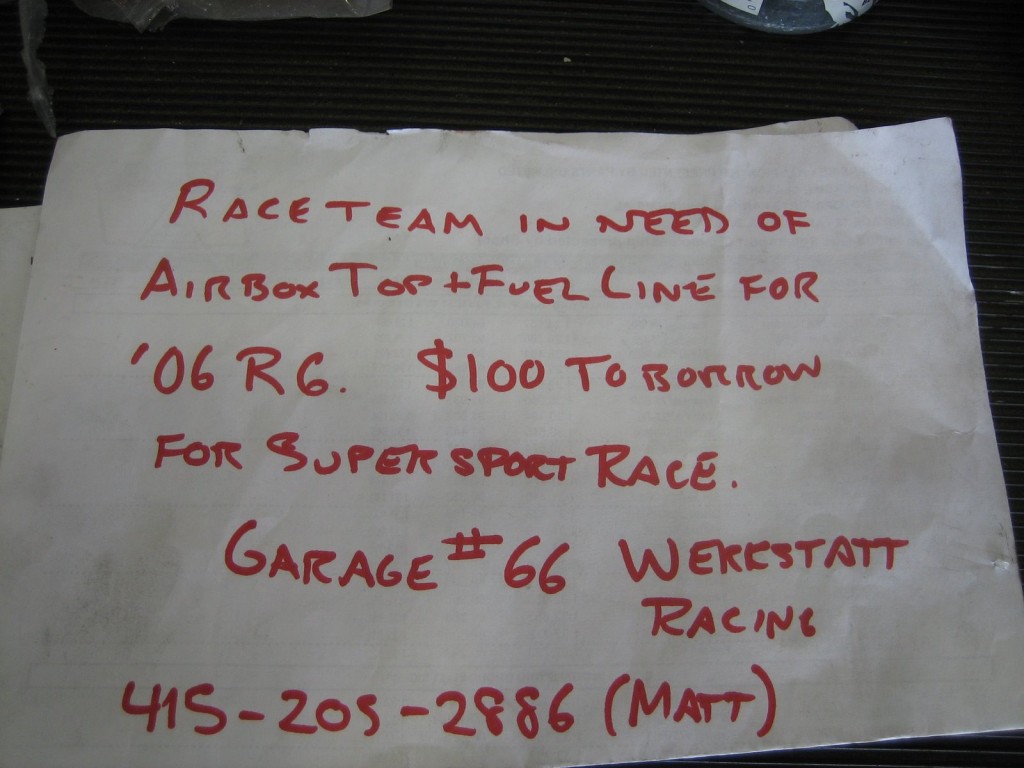
And lo and behold, the only person who had a then-brand new 2006 Yamaha R6 actually came through and let me take parts of his bike to complete the race bike so we could race. The race was at 11 am, and we finished the bike and rolled onto the grid with 3rd call. Phew! The competitors looked a little wary when we rolled up since we had also crashed the race before and they probably considered us a wild card, thinking we would blow up again. But we finished the race! It was a very emotional moment when Matt crossed the finish line. Finishing that race meant that we qualified for the Laguna Seca round which was also the first year of MotoGP in the US. We got to see Valentino Rossi in the pits and had a good race there as well.
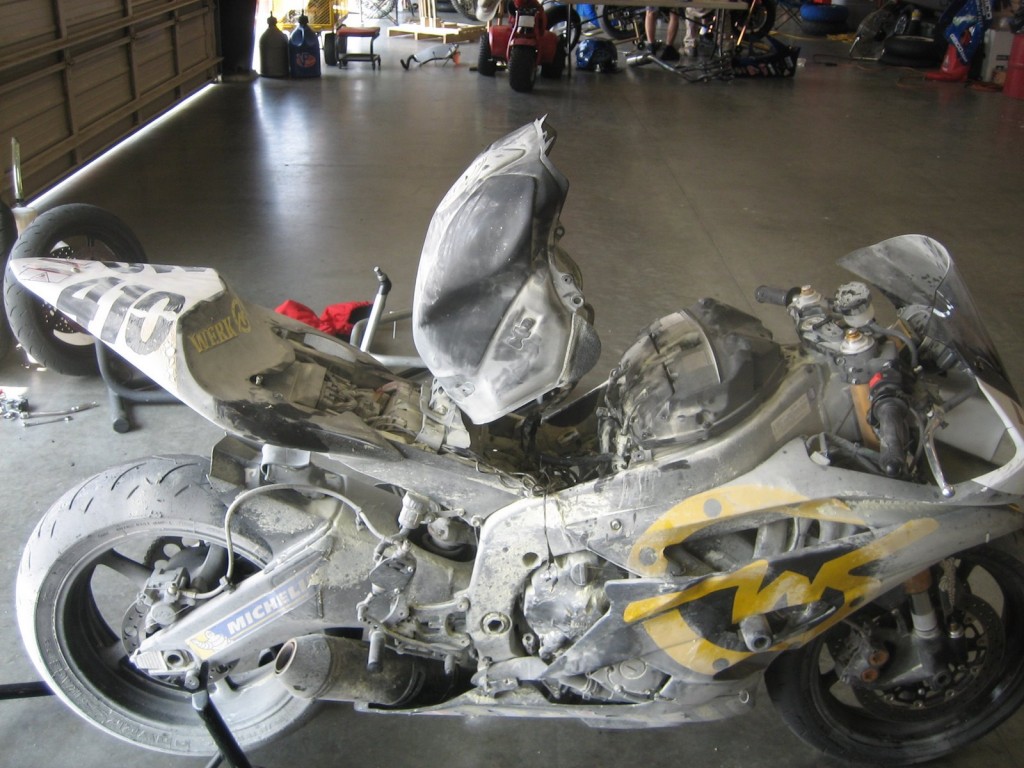
In your experience as a mechanic, have you noticed any patterns in the kinds of “avoidable” tasks people bring their bikes into the shop for? Yes. It will save you money and time if you know the basics, because you will catch minor issues before they become expensive problems. At the minimum, learn how to check your oil on a regular basis, and how to adjust and lube your chain. The chain will last 3 times as long if you keep it maintained. Also look for a basic maintenance class at a local shop or at a city college.
What are your thoughts on the changing technology in motorcycling? When I first started riding, bikes were still breaking down frequently and you had to know how to wrench a little if you wanted to arrive anywhere. Nowadays the big brand motorcycles just run and run, needing almost nothing but maintenance, brakes, and tires. Likewise, their owners don’t know too much about the inner workings of their rides. They don’t have to since the bikes are so problem free, but it still makes me a little sad.
As for progress and electric bikes, I raced an electric bike in 2010 and I was very excited about it. I also placed second in the TTXGP North American Championship. I think the technology still has far to go and the main factor in performance will be the software engineering of the brain. I’m ambivalent about the environmental aspect of electric bikes. Although combustion engines are not the best thing for the environment, neither is production of the batteries that e-bikes need, nor is the production of the electricity that powers them.
I’m definitely still into the nuts and bolts, and I find myself owning older and older bikes.
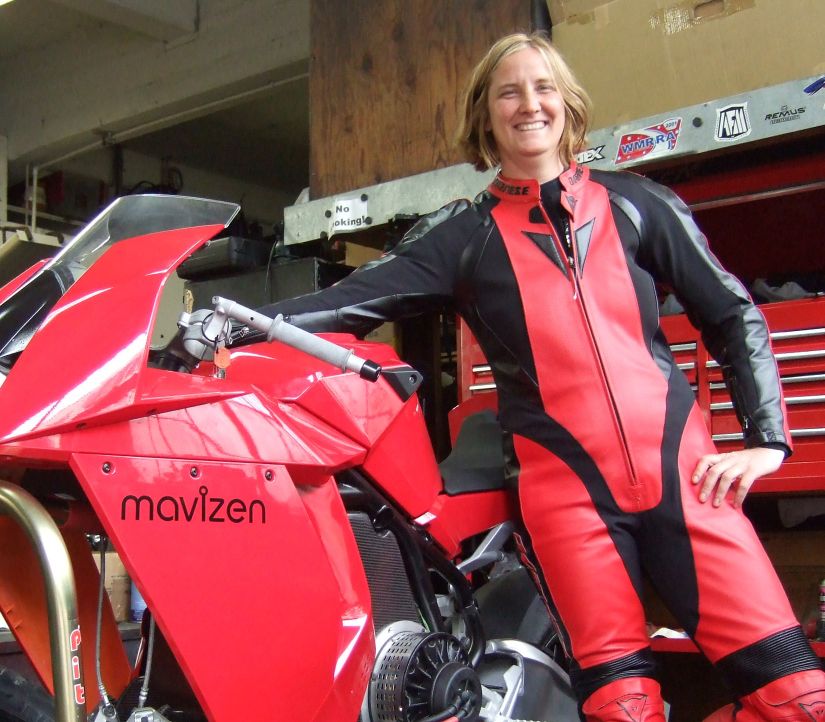
Jennifer Bromme with a Mavizen electric bike
You race too! Can you talk a bit about that? I had a great time racing, starting with racing a sidecar with my best friend Christine Blunck with Subculture Racing, and then a Yamaha FZR400 and then a 2003 Suzuki 750 in the AFM 750 Superbike. I love the camaraderie, and any woman thinking about racing should definitely do it. You will have a lot of respect and support once you get out there, and it is a blast. Unfortunately I broke my hip in a 100m ph high side racing 750 Superbike, but after a hiatus I started racing a CB160 in vintage AHRMA and lastly the Mavizen E-bike. Unbeknownst to me I was pregnant at my last race in Spain- so that was technically the first race of my daughter Elisabeth!
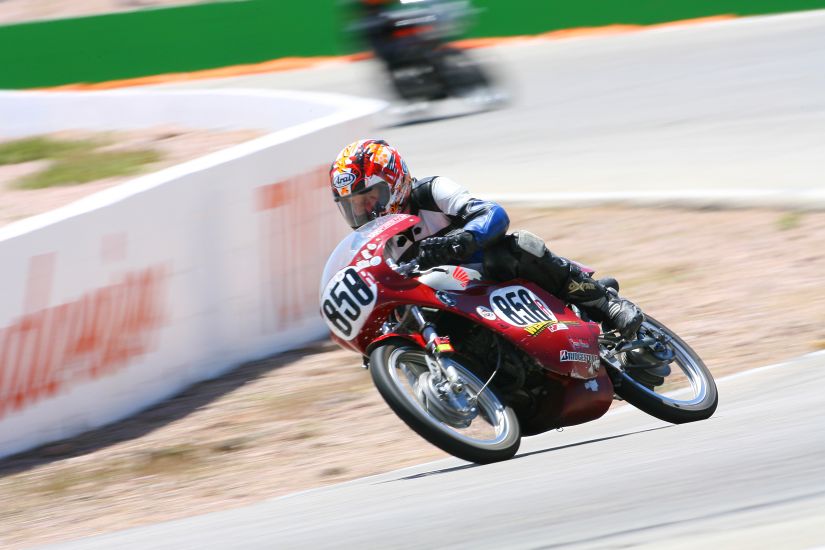
Jennifer Bromme on the race track

Jennifer Rromme with her trackbike
Describe your current motorcycle. I really loved my KTM 950 Adventure. It is big and suits me well, although it is technically quite flawed, as small production bikes are. The sound, feel, and handling however is amazing and when riding it makes me feel like I can do anything!
Did you have any mentors along the way who contributed to your growth as a rider and mechanic? Peter Stark, who trained me to fix anything. Andrew Govan-Smith who encouraged me to open the shop. Robbie Hoyt (RIP) who got me racing. Ed Milich, my partner and daddy to our kids for supporting me always.
What other interests do you have outside of work? My shop is my first baby, but since my daughter Elisabeth and my son Peter arrived, we have a little bit of sibling rivalry. When I’m home I spend a lot of time gardening, cooking and making my own food. So usually I have black fingernails either from wrenching or digging in the dirt! I like getting out in nature with the bikes and the kids, soon hopefully on dirt bikes when they both turn four.
What was the last book you read that inspired you? The Rugged Road. It’s a diary of two women who rode a sidecar from England to South Africa in 1934. Makes me realize that women could always do it, and it is not a recent phenomenon that women do outstanding things.
If someone reading your interview decided that she wanted to follow in your footsteps and become a motorcycle mechanic, what advice would you give her? If you want to become a mechanic in the US there are limited options. You could go to MMI or Wyotech, which will take 2 years, costs lots of money and will get you to an entry level position. Or you do an apprenticeship, which is unpaid but it’ll get the foot in the door, and will then help you get a job as an entry level mechanic.
Unfortunately nobody really offers apprenticeships and there is no official facilitating of this like there is in other countries. but you could make private arrangements with a shop. Becoming a mechanic takes a couple of years of apprenticing. A dealership is also a good place to get into once you got the basics down since they offer Certified Training on the makes they carry. Persistence is the key in trying to get hired.
Good techs are hard to come by these days, so you’ll be in demand once you know what you’re doing. The good thing about wrenching on motorcycles is that you need more brains than brawn, and there are lots of tricks to make up for lack of muscle like power tools etc.
What kind of legacy do you hope to leave? I’d like other women to be empowered by what I did and realize that they can do whatever they want to do. It might be a little harder, but anything can be achieved. You can do it!
Are you on any social media on which readers can follow you? They can “like” Werkstatt Racing on Facebook. My Twitter id is @jenwerkstatt.
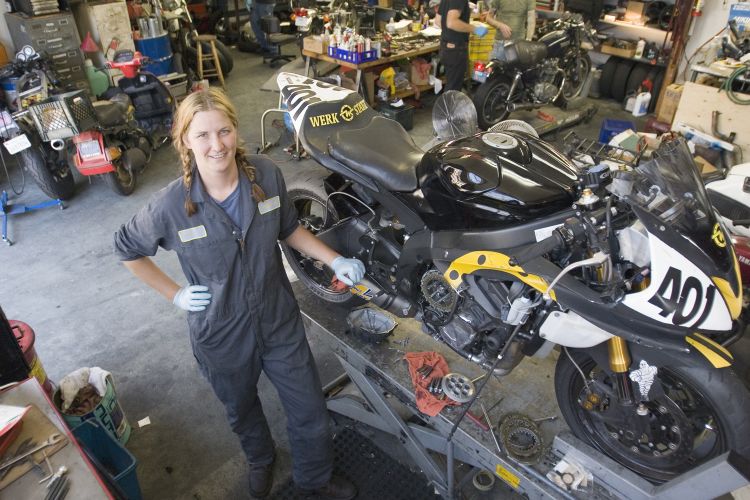
Jennifer Bromme on her shop floor (Photo Credit: Sara Lyon)

